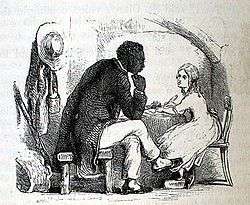Uncle Tom syndrome
Uncle Tom syndrome is a theory in psychology[1] referring to a coping skill in which individuals use passivity and submissiveness when confronted with a threat, leading to subservient behaviour and appeasement, while concealing their true thoughts and feelings. The term "Uncle Tom" comes from the title character of Harriet Beecher Stowe's novel Uncle Tom's Cabin, where an enslaved African American man named Tom is beaten to death by a cruel master for refusing to betray the whereabouts of two other enslaved people.

In the American racial context, "Uncle Tom" is a pejorative term for African-Americans who give up or hide their ethnic or gender outlooks, traits, and practices, in order to be accepted into the mainstream. Conservative African-Americans are often called "Uncle Toms". In race minority literature, Uncle Tom syndrome refers to African Americans that, as a necessary survival technique, opt to appear docile, non-assertive, and happy-go-lucky. Especially during slavery, African Americans used passivity and servility for the avoidance of retaliation and for self-preservation.[2]
In a broader context, the term may refer to a minority's strategy of coping with oppression from socially, culturally or economically dominant groups involving suppression of aggressive feelings and even identification with the oppressor, leading to forced assimilation/acculturation of the cultural minority.[3]
References
- Jackson, Yo; Yolanda Kaye Jackson (2006). Encyclopedia of multicultural psychology. SAGE Publications. p. 509. ISBN 1-4129-0948-1., overviews of terms available here
- Sue, Derald Wing; Monica McGoldrick (2005). Multicultural social work practice. John Wiley and Sons. p. 54. ISBN 0-471-66252-6.
- Mio, Jeffrey Scott (1999). Key words in multicultural interventions. Greenwood Publishing Group. p. 204. ISBN 0-313-29547-6.